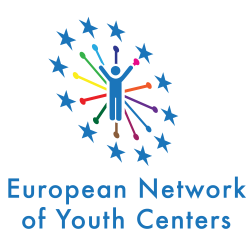[…] The Bureaux of the Governing Board and the CDEJ set up in December 1998 a working group composed of non governmental and CDEJ representatives whose task was to study the feasibility of the setting-up of such a network. This group met in February this year and followed the conclusions of the Vilnius Seminar on «the criteria and objectives of a network of European youth centres» in order to carry out its work. Organised in January 1999, at the initiative of the Lithuanian authorities, in the framework of co-operation of the States of the Baltic Sea region, this Seminar led to the definition of a certain number of criteria which could apply to the functioning of the network and its members, as well as the possible benefits for the participation in this network:
For the Council of Europe:
promote its values and its work and thus increase its visibility;
- organise training courses in partner youth centres in the network;
- receive information on the situation of young people and youth policies implemented in areas of network centres;
- reach other groups of young people than those using the European Youth Centres in Budapest and Strasbourg.
For the youth centres in the network:
use Council of Europe resources with respect to training and information, such as:
- holding activities supported by the European Youth Foundation;
- participating and have access to a trainers pool;
- internship/job shadowing in the European Youth Centres in Budapest and Strasbourg;
- using the information and documentation available from the Council of Europe Youth Directorate;
- co-operating with and having contact with other youth centres of the network;
- participating in meetings organised by the Council of Europe for the network in order to co-ordinate the work, exchange information, experiences and good practice. These being a meeting point for national training practices and those of the Council of Europe, thereby developing new methods for use in the youth organisations;
- stimulating the formulation of youth policies in the countries by promoting the ideas of the Council of Europe in the field of youth policy.
5. In accordance with its terms of reference, the working group «defined guidelines and criteria for the recognition of decentralised centres and functioning of the network»:
i. the network should be composed of national youth centres –already set up or to be set up – the option of a regional or a decentralised centre no longer being a pre-condition to become part of the network. During its meeting on 16-18 March 1999, with regard to the network’s name, the CDEJ approved the working group’s proposal to call it the «Network of National Youth Centres»
ii. the Council of Europe should ensure the functioning and the co-ordination of the network.
6. The list of the criteria identified during the Vilnius Seminar corresponds to the quality criteria applied to the functioning and activities of the Strasbourg and Budapest EYCs, as examined and amended by the group and forms the basis of provisions pertaining to the setting-up of the network and its centres :
1) Members of the network are youth centres defined as residential centres with pedagogical and educational competence and services for youth and youth activities with an international dimension;
2) Youth centres should involve young people in the decision making process
3) The network will be open to representatives of all the member States of the Council of Europe and the States Party to the European Cultural Convention, in accordance with the following modalities:
- countries which already have a youth centre;
- countries which are planning to establish a youth centre;
- countries which would like to benefit from the information flow in the network.
7. Therefore, the first idea to promote the support for training of NGO youth leaders and the support for youth NGOs for the development of associative life in the framework of democratic and pluralistic structures in central and eastern European countries along with southern Europe, was enlarged to the promotion of the values and the work of the Council of Europe in all the member States of the Council of Europe and the States Party to the European Cultural Convention in order to set-up a network of centres, the aim of which should be:
- to improve co-operation between youth centres in different countries and coordinate the work under the auspices of the Youth Directorate of the Council of Europe;
- to improve educational competence;
- to encourage intercultural learning;
- to promote participation of young people in civil society, to promote the development of associative life and to strengthen international co-operation between young people in accordance with Resolution 98(6) of the Committee of Ministers of the Council of Europe;
- to promote the values of the Council of Europe, especially Human Rights and active democratic citizenship;
- to exchange experience and good practice;
- to produce and spread information and knowledge about the youth work of the Council of Europe, the European Union and other relevant institutions;
- to contribute to the development of national, regional and local youth policies.
8. The youth centres, members of the network, residential youth centres with pedagogical and educational competence and services for youth and youth activities with an international dimension, should follow these criteria:
- organise and facilitate international youth activities;
- promote intercultural learning, respect for Human Rights, democracy, youth participation, active democratic citizenship and an international dimension in national youth activities;
- ensure the concrete involvement of young people in its decision making process;
- have the necessary educational resources: permanent pedagogical staff and adequate equipment.
9. The working group also defined the guidelines on the co-ordination and financing of the network
Co-ordination and financing of the network
The co-ordination of the network should be the responsibility of the Council of Europe, through its Youth Directorate. Within the next year the Council of Europe could convene a meeting to which interested institutions will be invited. Prior to this meeting, the Council of Europe could undertake a survey on existing and planned youth centres in the respective countries.
The Council of Europe should recommend that national authorities are responsible for supporting the youth centres. As they are youth centres, youth work is their first priority.
Each youth centre and country should find funding and other kinds of co-operation with the private sector, provided that the image and the nature of the youth centre is respected.
The Council of Europe would be responsible for financing the meetings of the network.
10. Plan for action and calendar
The group made the following proposals :
1. As regards the countries which are ready to establish such centres
At the demand of the group, a letter was sent to all the CDEJ members in March 1999 in order to have a picture of the countries having an interest for the setting-up of such a centre, member of the European network. To this date, five countries have expressed their interest :
Finland and Lithuania already have such centres
Liechtenstein would open an information centre
Belgium and Norway do not have such centres and do not intend to open such centres in the near future
All these countries would like to benefit from the information flow in the network.
Moreover, it should be mentioned that during the Ministerial Conference in Bucharest (April 1998) the three Caucasian countries undertook, in a signed declaration, to set up a Transcaucasian youth centre (see Document MJN-5 (98) 5, Appendix 3). Spain also wishes to open such a centre. The European Youth Centre in Eksjö (Sweden) which should be opened at the beginning of 2000 is ready to organise a conference for the lauching of the network of centres with the help of the Youth Directorate of the Council of Europe. During the 104th meeting of the Committee of Ministers in Bucharest (7 May) «the former Yugoslav Republic of Macedonia» also expressed its wish to set up a European Youth Centre in Ohrid, with a regional approach.
2. As regards the recognition of the centres
The group decided that the legal framework should be as flexible as possible. A country which would like to join the network of the national youth centres should send a letter with the following references :
- description of the centre;
- description of its activities;
- presentation of its budget;
- presentation of its decision-making structures, being agreed that it should be based on the co-management principle. The members of the group underlined that this co-management could be open and could include several partners.
However, during its March meeting (16-18 March 1999), the CDEJ, having examined the proposals of the working group, considered that a suitable legal framework for the recognition of the centres would also need to be defined, through a charter, a code of good practice or a partneship agreement.
3. As regards the setting-up of a network
The Joint Council should give terms of reference to the Programming Committee for the management of this network, for which it is necessary :
- to draft terms of reference
- to set up a budgetary line in order to provide the centres with information and documentation of the Council of Europe and for the financing of the network’s meetings.
4. As regards the organisation of activities
The National Youth Council of the country in question, or any other umbrella organisation, could check if the activities undertaken are in line with the criteria.
An annual activity report should be sent to the Youth Directorate for examination and transmitted to the Programming Committee or an ad hoc structure for approval.
The Youth Directorate should also set-up a data bank of the trainers pool.
The list of criteria could be examined by the Joint Council and adopted during the October meeting ; it could then define a budgetary line for the setting-up of the network and give terms of reference to the Programming Committee for the management of this project.
A list of the trainers available could be then drafted.
The CDEJ and the Advisory Council both approved during their March meetings the inclusion of the activity as a priority in the programme for 2000, as a tool for the promotion of the values and principles of the Council of Europe with young Europeans, such as intercultural learning, respect for Human Rights, democracy, youth participation, active democratic citizenship. This opportunity which may be given to the spreading and promotion of these ideas to young people who do not have the possibility to meet in the Budapest and Strasbourg Centres, meeting each other in different European regions is, besides the fact that it increases the visibility of the Council of Europe, a unique way to build with the young European citizens a greater Europe without dividing lines.
The European Youth Centre in Eksjö (Sweden) which should open at the beginning of 2000, is ready to organise a conference for the launching of the network of decentralised centres with the Council of Europe hosted by the Swedish Government at the beginning of 2000. Representatives of the Governing Board of this Centre have already visited the EYC in Strasbourg to see how it operates and is managed.
For the full version of the text, please access the link below:

